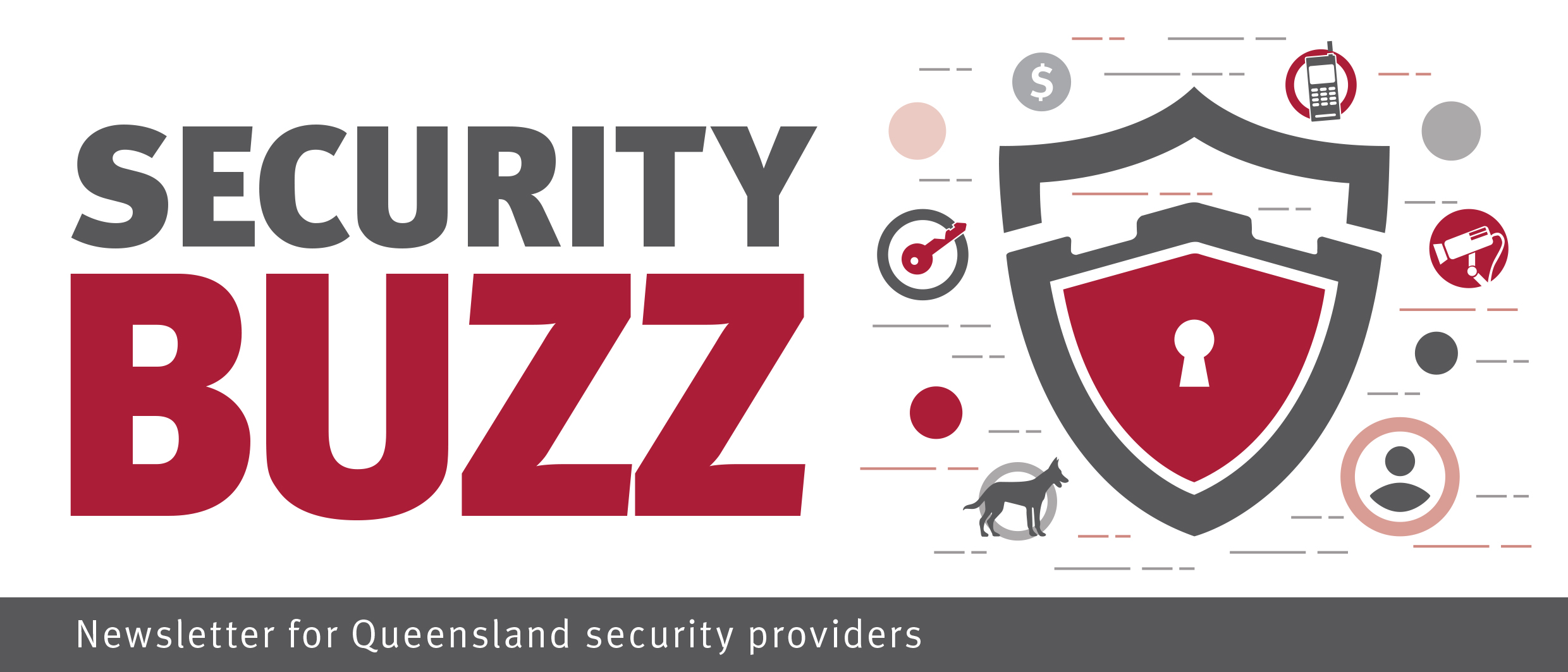Security Buzz April 2021

Welcome to the April 2021 edition of the Office of Fair Trading’s (OFT) Security Buzz, an e-newsletter for Queensland security providers.
In this edition
- Security provider training
- Online renewals
- When you need to return your security licence
- Why verifying your employees’ licence status is vitally important
- Schoolies 2020 wrap-up
- Easier way for workers to recover wages
Security provider training
From 21 January 2021, only the approved training which is taken from the training packages CPP20218 Certificate II in Security Operations, CPP31318 Certificate III in Security Operations and CPP31418 Certificate III in Close Protection Operations will be accepted for security licensing purposes in Queensland. This applies to applicants for a bodyguard, crowd controller, security officer (unarmed), security officer (cash in transit) or security officer (dog patrol) licence.
If you apply for a licence containing any of these functions, or to add one of these functions to an existing security provider licence, you will need to complete the full list of units from the current approved training for each function you apply for.
For a full list of the approved training for each security provider function, visit www.qld.gov.au/fairtrading.
Online renewals
If you are affected by disruptive events such as weather conditions or health-related restrictions, never fear—you can renew your individual security provider licence online!
Please note there is no grace period for late applications under the Security Providers Act 1993, and any late renewals must be treated as new applications. Jump online to avoid disruptions in your licence status.
When you need to return your security licence
If you surrender your security licence or it is cancelled, you must return your physical licence to the OFT.
Similarly, if the functions you are permitted to perform change, you must return your licence so we can issue you an updated one. Most commonly this happens when a security provider fails to complete their mandatory refresher training, resulting in the cancellation of the crowd controller function of their licence. If this applies to you, we will write to you regarding returning your licence so an updated one may be issued to you.
Why verifying your employees' licence status is vitally important
When job applicants lie about their licence status, they not only put themselves at risk, they also put the security firm or venue at risk. Employing an unlicensed security provider is a breach of the Security Providers Act 1993 and carries significant penalties.
That’s why it’s important to ensure anyone you employ to provide security services holds the required licence to do so.
When hiring new staff, you should always check the applicants’ licence details via our free online 'check a licence' register. You should also regularly check your employees’ credentials to ensure their licence hasn’t lapsed or been suspended or cancelled.
The maximum penalty for engaging an unlicensed officer to provide security services is significant at $66,725 for a first offence, $93,415 or 6 months imprisonment for a second offence, and $133,450 or 18 months imprisonment for a third offence.
Schoolies 2020 wrap-up
COVID-19 had a significant impact on many events in 2020, and Schoolies Week was no exception. Regardless of the cancellation of formal Schoolies Week activities, many schoolies attended the Gold and Sunshine Coasts and we conducted 49 security compliance checks during that period. Several issues were identified, as we saw security officers engaged to monitor accommodation venues as well as licensed premises.
It is important that security firms that engage or employ security personnel ensure officers are appropriately licensed to carry out all the functions they are engaged to perform, even when hired at short notice. A person performing crowd controlling functions is required to hold a crowd controller licence. A person monitoring property as a static guard is required to hold a security officer (unarmed) licence. Often people will hold both licences, enabling them to perform both functions, but not always.
Given the effect that COVID-19 has had on availability of security providers, it is more important than ever to include contingencies in operation and event plans to ensure anyone engaged to provide security provider functions is licensed to do so.
Easier way for workers to recover wages and entitlements
From 1 March 2021 Queensland workers who have been underpaid can recover what they are owed more easily by lodging a claim in the Industrial Relations Commission.
Claims can be for penalty rates, unlawful or unreasonable deductions from wages, and superannuation.
Small claims, of up to $20,000 for workers employed under the Federal Fair Work Act and $50,000 for workers in the Queensland state system, will be dealt with through informal court proceedings.
The first step for workers is to approach an industrial commissioner for conciliation. If the claim cannot be resolved through conciliation, the next stage is to proceed to the Industrial Magistrates Court.
Wage theft became a criminal offence in Queensland in 2020 and this system, created to align with this, allows claims to be resolved in a cheaper and easier way with workers not even needing to engage lawyers.
For more information or to make a claim.
Stay up to date on COVID-19 information
Here at the OFT we are working hard to help you navigate the impacts of the public health directives issued by Queensland’s Chief Health Officer on industries we regulate.
We will continue to update our online information as the directives change.


